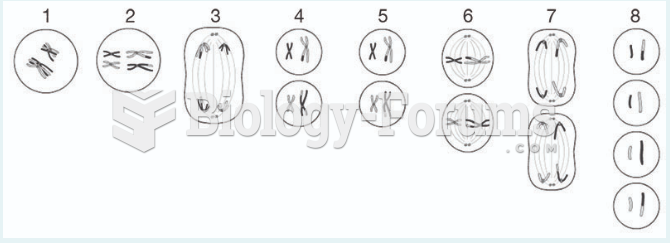|
|
|
Green tea is able to stop the scent of garlic or onion from causing bad breath.
The human body produces and destroys 15 million blood cells every second.
Though “Krazy Glue” or “Super Glue” has the ability to seal small wounds, it is not recommended for this purpose since it contains many substances that should not enter the body through the skin, and may be harmful.
GI conditions that will keep you out of the U.S. armed services include ulcers, varices, fistulas, esophagitis, gastritis, congenital abnormalities, inflammatory bowel disease, enteritis, colitis, proctitis, duodenal diverticula, malabsorption syndromes, hepatitis, cirrhosis, cysts, abscesses, pancreatitis, polyps, certain hemorrhoids, splenomegaly, hernias, recent abdominal surgery, GI bypass or stomach stapling, and artificial GI openings.
In the United States, there is a birth every 8 seconds, according to the U.S. Census Bureau's Population Clock.
 Attachment of transmembrane proteins to the cytoskeleton and extracellular matrix of an animal cell.
Attachment of transmembrane proteins to the cytoskeleton and extracellular matrix of an animal cell.
 White steam is usually an indication of a blown (defective) cylinder head gasket that allows engine ...
White steam is usually an indication of a blown (defective) cylinder head gasket that allows engine ...





